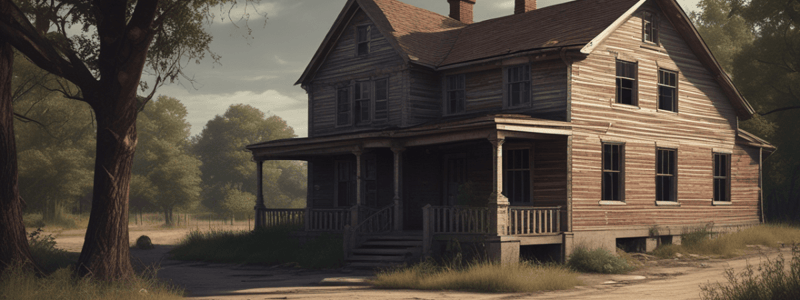Podcast
Questions and Answers
What is a key indicator that an owner has relinquished control over their property?
What is a key indicator that an owner has relinquished control over their property?
- The property has been vandalized by others
- The owner has explicitly stated they are no longer the owner
- The owner has left the property for an extended period
- The owner has voluntarily abandoned the property (correct)
Under what circumstances can personal property be assumed abandoned?
Under what circumstances can personal property be assumed abandoned?
- If it is left in a public place with a clear owner
- If it is stored in a locked container
- If it is dropped or thrown away in a public place (correct)
- If it is in a private residence with no signs of ownership
What is a challenge when trying to establish abandonment of premises?
What is a challenge when trying to establish abandonment of premises?
- It is always easy to establish abandonment of premises
- Identifying the lack of maintenance
- Establishing the duration of no occupancy
- Determining the owner's intention (correct)
What is a characteristic of an abandoned vehicle?
What is a characteristic of an abandoned vehicle?
What is required to justify a search of abandoned property?
What is required to justify a search of abandoned property?
What is an indication that a vehicle may be abandoned?
What is an indication that a vehicle may be abandoned?
What is defined as the amount of privacy considered appropriate by society, as reflected in the law?
What is defined as the amount of privacy considered appropriate by society, as reflected in the law?
What type of area has no legitimate expectation of privacy and is not part of an area that would normally be considered curtilage?
What type of area has no legitimate expectation of privacy and is not part of an area that would normally be considered curtilage?
What is the term for the grounds and buildings immediately surrounding a house or other living space?
What is the term for the grounds and buildings immediately surrounding a house or other living space?
What is the term for an area that is freely accessible to members of the public, but is still part of a curtilage?
What is the term for an area that is freely accessible to members of the public, but is still part of a curtilage?
What is the standard for searching a curtilage?
What is the standard for searching a curtilage?
What is the standard for searching a public area?
What is the standard for searching a public area?
Under what circumstances can law enforcement officers board buses to conduct cursory investigations for drugs?
Under what circumstances can law enforcement officers board buses to conduct cursory investigations for drugs?
What is the limitation on handling luggage by law enforcement officers on a bus?
What is the limitation on handling luggage by law enforcement officers on a bus?
What is the exception to the rule that public areas have no expectation of privacy?
What is the exception to the rule that public areas have no expectation of privacy?
Under what circumstances does the exception to the rule of no expectation of privacy in public rest rooms and phone booths not apply?
Under what circumstances does the exception to the rule of no expectation of privacy in public rest rooms and phone booths not apply?
What is the implication of the increased use of cell phones and the diminishing number of public phones?
What is the implication of the increased use of cell phones and the diminishing number of public phones?
What is permitted if officers are not on curtilage?
What is permitted if officers are not on curtilage?
What was the outcome of the Minnesota v. Carter case?
What was the outcome of the Minnesota v. Carter case?
What is required to claim Fourth Amendment protection?
What is required to claim Fourth Amendment protection?
What is the significance of the case Rakas v. Illinois?
What is the significance of the case Rakas v. Illinois?
What determines the extent of Fourth Amendment protection?
What determines the extent of Fourth Amendment protection?
What is the significance of the case Minnesota v. Olson?
What is the significance of the case Minnesota v. Olson?
What is different about the expectation of privacy in commercial property?
What is different about the expectation of privacy in commercial property?
What is the significance of the case Jones v. United States?
What is the significance of the case Jones v. United States?
What is the significance of the case New York v. Burger?
What is the significance of the case New York v. Burger?
What is the condition for an officer to have legal access to seize evidence?
What is the condition for an officer to have legal access to seize evidence?
What happens if evidence is on curtilage and in plain view, but outside the area where the officer has legal right to be?
What happens if evidence is on curtilage and in plain view, but outside the area where the officer has legal right to be?
Are private citizens bound by the Fourth Amendment requirements?
Are private citizens bound by the Fourth Amendment requirements?
What is the limitation on the scope of the search by an officer based on information obtained by a private citizen?
What is the limitation on the scope of the search by an officer based on information obtained by a private citizen?
What happens if law enforcement officers participate in or encourage a private citizen's search?
What happens if law enforcement officers participate in or encourage a private citizen's search?
What is the requirement for an officer to seize evidence in plain view?
What is the requirement for an officer to seize evidence in plain view?
Flashcards are hidden until you start studying
Study Notes
Abandoning Property and Reasonable Expectation of Privacy
- Abandoning property indicates no reasonable expectation of privacy, as the owner gives up dominion and control.
- To show that property is abandoned, it must be reasonable to believe that the ownership of the property has been relinquished voluntarily.
- Examples of abandoned property include:
- Personal property dropped or thrown away in a public place
- Property left in the trash in a non-curtilage area
- Property left unclaimed by its owner when asked
- Vehicles left unmoved in a public place for an extended period
- Vehicles left running at the end of a pursuit
- It is difficult to establish abandonment for premises, as it is not unusual to leave a home or business for an extended period with no intention of giving up ownership.
Non-Fourth Amendment Searches
- A reasonable expectation of privacy is defined as the amount of privacy considered appropriate by society, as reflected in the law.
- Key terms and doctrines in Non-Fourth Amendment searches include:
- Open field: any area of public land or private land in which the owner has no legitimate expectation of privacy.
- Curtilage: the grounds and buildings immediately surrounding a house or other living space which are commonly used for family and/or other home-life activities.
- Public area: area to which the public has unrestricted access and which is not part of an area which would normally be considered curtilage.
- Quasi-public area: area which would normally be considered part of a curtilage but which is freely accessible to members of the public.
Search Justification
- No justification is needed to search abandoned property.
- Justification is needed to search other areas, including:
- Open field: no justification needed if the land is a public area.
- Curtilage: probable cause is needed to justify a search.
- Public area: no justification needed.
- Quasi-public area: a legitimate investigative purpose is needed to justify the search.
Special Circumstances
- Law enforcement officers may board buses to conduct cursory investigations for drugs, and drug dogs may be brought on board.
- Officers may search public areas, but certain areas like public restrooms and phone booths are not considered "open fields" and require a reasonable expectation of privacy.
- Surveillance is reasonable if officers are not on the curtilage and use unaided senses, or aids readily available to the average citizen, such as binoculars.
Fourth Amendment Rights
- The Minnesota v. Carter case (1998) held that respondents had a legitimate expectation of privacy in the invaded place, and the officer's observation constituted an unreasonable search.
- To claim Fourth Amendment protection, a defendant must demonstrate that they personally have an expectation of privacy in the place searched, and that their expectation is reasonable.
- The Fourth Amendment protects persons against unreasonable searches of "their persons [and] houses," and thus indicates that it is a personal right that must be invoked by an individual.
Plain View Doctrine
- The three elements required for a valid seizure under the Plain View Doctrine include:
- The officer has the legal right to be in the location where the items were seen.
- The officer immediately recognizes the property, with probable cause certainty, as evidence of a crime or contraband.
- The officer has legal access to the area to seize it (appropriate access per recognized search parameters).
- If evidence or contraband is on curtilage, in plain view of the officer, but outside the area where they have the legal right to be, then impound (secure) the property and seek a search warrant to make the entry.
Private Searches
- Private citizens are not bound by the requirements/restrictions of the Fourth Amendment that are placed on law enforcement persons.
- The scope of the search by an officer based on the information obtained by a private citizen during a search is limited to the same area as the original private search.
- Officers may use information gathered by a private citizen in a search, so long as no law enforcement officers took part in or encouraged the citizen's intrusion into the suspect's protected area.
Studying That Suits You
Use AI to generate personalized quizzes and flashcards to suit your learning preferences.



